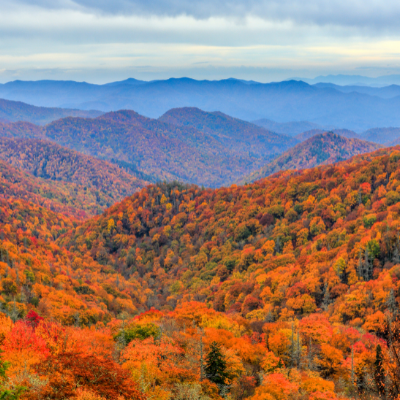Moving to North Carolina Guide: Discover the Tar Heel State
We created this guide for moving to North Carolina to help those who are in their very early stages of researching where they’d like to move. So, what exactly do you need to know before moving to North Carolina? We’ve complied some of the most important items you should consider when making this big decision. According to 2020 Census data, North Carolina was in the top fifteen fastest growing states of the last decade, with an impressive 9.5% growth in population. So, is North Carolina the right state for you to move?
What You Need to Know about North Carolina’s Geography

North Carolina is a state in the southeastern region of the U.S. with Virginia to the north, the Atlantic Ocean to the east, Georgia and South Carolina to the south, and Tennessee to the west. Fun fact: there is evidence of human occupation of North Carolina dating back to 10,000 years ago!
If you love exploring the outdoors, North Carolina may be the right place for you. In fact, with an area of 53,819 square miles, North Carolina can be divided into three distinct geographic and climate regions: the Atlantic coastal plain, the central Piedmont region, and the Mountain region in the west.
From the Outer Banks, a string of sandy barrier islands, to the “Graveyard of the Atlantic,” also known as Cape Hatteras, and not to forget the Blue Ridge Mountains of the larger Appalachian Mountain range, you’re sure to be inspired by North Carolina’s natural beauty. The variety in the typography is just one of the many things to love about North Carolina.
North Carolina’s highest point is Mount Mitchell, and it stands at 6,684 ft tall. By comparison, North Carolina’s lowest point is in the Atlantic Ocean, and that’s 0 ft! Speaking of high points, Mount Mitchell is the highest mountain in the U.S. east of the Mississippi River, and it is also known as Attakulla by the Cherokee people, who long occupied this area as part of their ancestral homeland.
Moving to North Carolina Guide on the Weather in North Carolina

North Carolina’s climate varies widely depending on where in the state you go. It may surprise you to learn that North Carolina’s elevation above sea level is most responsible for temperature changes across the state, with the mountain regions being coolest year-round. North Carolina’s climate is also influenced by the Atlantic Ocean and the Gulf Stream, both of which tend to cause warmer winter temperatures along the coast.
This just means monthly normal high and low temperatures really depend on where in the state you live. Winters across the state can see low temperatures in the 30s all the way up to a high in the 60s. They can be cold, although extended periods of bitter freezing weather and snow are unusual.
Spring brings temperature lows in the 40s and highs can reach over 70 degrees. Summertime is when North Carolina really shines with lows in the sixties and highs all the way into the nineties! In fall, North Carolina really cools off after a sizzling summer with lows sometimes getting into the fifties and highs almost reaching into the seventies.
The state has dangers associated with hurricanes, tropical storms, heavy rains, and flooding, all of which should be something to consider if you plan to build a home.
Moving to North Carolina Guide on Getting a Job in the Tar Heel State

If you’re looking for a place to grow your career, consider moving to North Carolina! According to an article published by the North Carolina Chamber of Commerce, at the time of writing this article, the state of North Carolina has seen a steady job growth rate compared to the rest of the United States. Moreover, in 2021, North Carolina had a lower unemployment rate than the national average!
North Carolina continues to add more jobs, resulting in a steady unemployment rate of around 4.4%. Industries showing solid job gains included aerospace and defense, automotive and heavy machinery, and biotechnology and pharmaceuticals.
What’s the situation on buying alcohol in North Carolina?

Who isn’t curious about how to toast moving to a new state! North Carolina alcohol laws are tough – they make no exceptions for consuming alcohol under age 21. Retailers may sell or serve alcohol between 7 a.m. and 2 a.m. Mondays through Saturdays, and they may only sell or serve it after noon on Sundays. However, some counties and towns further restrict Sunday sales.
But good news! Wine has been produced in the state since the early days of European colonization in the 17th century. Wine growers in North Carolina were the first to cultivate a Native American grape variety, the Scuppernong, which produces a sweet wine, examples of which are still made in the state today.
Fun fact: A new bill in the state would allow cities to create “social districts,” where people can buy, carry and drink liquor outside bars and restaurants.
What is there to do in North Carolina?

Hopefully you like hiking and camping! There are forty-one state parks in North Carolina, including Jockey’s Ridge State Park, Jordan Lake State Park, and Fort Macon State Park, that will make every weekend an adventure! Looking for something a little wild? There are also ten national parks and scenic beaches that might pique your interest, too!
Another choice is to head over to Charlotte for culture, food, and fun. A rapidly growing big city, Charlotte boasts a variety of fun and interesting things to do including the NASCAR Hall of Fame and the Opera Carolina.
However, if you’re like us, we’re sure you’ll agree that outdoor North Carolina is the best. You’ll be in awe each and everything you step outside!
Important State Symbols in North Carolina

The state of North Carolina has over fifty official state symbols; we’ve included a few of our favorites here. The first, and most important, is the state mammal – the grey squirrel! How cute!
The state fruit is the scuppernong grape, and the flower is the Dogwood. Another one of our favorite North Carolina symbols is the state folk dance: clogging. Probably the most unexpected state symbol is the state art medium – clay!
Lesser-Known FAQs About Moving to North Carolina
Q: What is the capital of North Carolina?
A: The capital of North Carolina is Raleigh, but Charlotte is the most populated area in North Carolina. The Charlotte metropolitan area, known as Greater Charlotte, includes counties in both North and South Carolina with a combined population of over 2.5 million, and growing! If you plan to move to North Carolina, you’ll probably find yourself in Greater Charlotte!
Q: How do North Carolina’s public schools rank nationally?
A: According to a study by US News, North Carolina public high schools rank 27/50 in a national breakdown tracking state-by-state high school performance. While education quality can vary widely depending on where in the state you live, this report takes the weighted average of the state’s high school performance into consideration.
Q: What kind of taxes can you expect to pay in North Carolina?
A: North Carolina has a flat income tax rate of 5.25%, meaning all taxpayers pay this rate regardless of their taxable income or filing status. This can make filing state taxes in the state relatively simple, as even if your salary changes, you’ll be paying the same rate. In fact, North Carolina’s property tax rates are also relatively low in comparison to those of other states.
The average effective property tax rate in North Carolina is 0.77%, well under the national average of 1.07%. (You also stop paying property tax after you turn sixty-five!). That said, Social Security income in North Carolina may not be taxed, but withdrawals from retirement accounts are fully taxed. Pension incomes are also fully taxed.
Goods are subject to sales tax in North Carolina include physical property, like furniture, home appliances, and motor vehicles, but prescription Medicine, groceries, and gasoline are all tax-exempt.
Q: What’s it like to vote in North Carolina?
A: If you are a first-time voter, you must register to vote twenty-five days before Election Day, and if you miss the deadline, you may be eligible to register and vote during the early voting period.
If you are eligible to register to vote, you have two primary ways to do so. You can register online or in person at the Department of Motor Vehicles (DMV) or by mail. No matter which way you choose to register, you must be a U.S. citizen living in the county where you are registering and have resided in that county for at least thirty days prior to the date of the election.
You’ll also need to be at least 18 years old and not be serving a sentence for a felony conviction, including probation, parole, or post-release supervision. Note: An inactive voter is still a registered voter. A voter who is inactive status will be asked to confirm their addresses when they appear to vote. No special document is required.
Q: What are the rules for switching your driver’s license in North Carolina?
A: If you have an out-of-state driver’s license, you’ll need to transfer it for an North Carolina license within 60 days of moving to the state in addition to getting your title and vehicle registered at the North Carolina Division of Motor Vehicles (NCDMV).
You must also bring your out-of-state license proving identity and date of birth; your social security card; one document verifying your physical address in North Carolina; and a document proving liability insurance coverage from a provider licensed to do business in the state. It’s strongly encouraged to book an appointment ahead of time online!
Q: When do you need to update your car plates in North Carolina?
A: To get a new North Carolina license plate, your vehicle must be titled and registered with the NCDMV and also pass a safety inspection, and if necessary, an emissions inspection. You must also visit an NCDMV license plate agency when getting a license plate for the first time. There are fees associated with the change, so be ready for that!
Q: What’s it like driving in North Carolina?
A: Like most state, the driving conditions in North Carolina are very different in urban and rural areas. Thankfully, North Carolina, in a tie with its western neighbor Oregon, ranked at number 44 as the state with the worst drivers in America.
Now, that doesn’t mean North Carolina drivers are perfect – you’ll want to keep your eye on the road in addition to looking out the window!
Q: Does North Carolina have any walkable cities?
A: Of all cities in North Carolina, the best bet for having a walkable lifestyle is going to be in either Boone, Elizabeth City, or Asheville, but even that’s not going to be totally easy. Each city has minimal public transportation, and depending on the weather, they may be somewhat bikeable. With the rapid growth of Charlotte, non-car options in that city have exploded and will also provide you with a walkable lifestyle.
Is North Carolina the Right State for You to Move?

For those of you looking for outdoor adventure, while still enjoying the creature comforts of city living, North Carolina (and specifically in Greater Charlotte) may be the right fit for you.
The beautiful typography of North Carolina, low taxes, and booming economy all lend themselves into making life great in the Tar Heel State. However, natural disasters like hurricanes and tropical storms, as well as middle of the pack schools, prove that while exceptional, North Carolina isn’t perfect.



